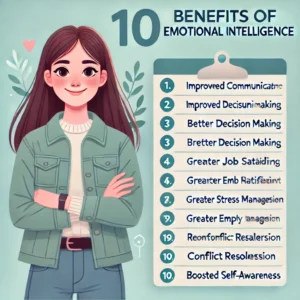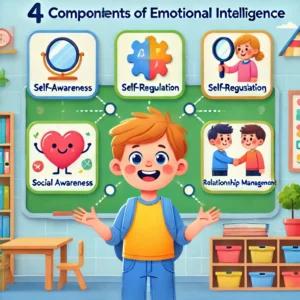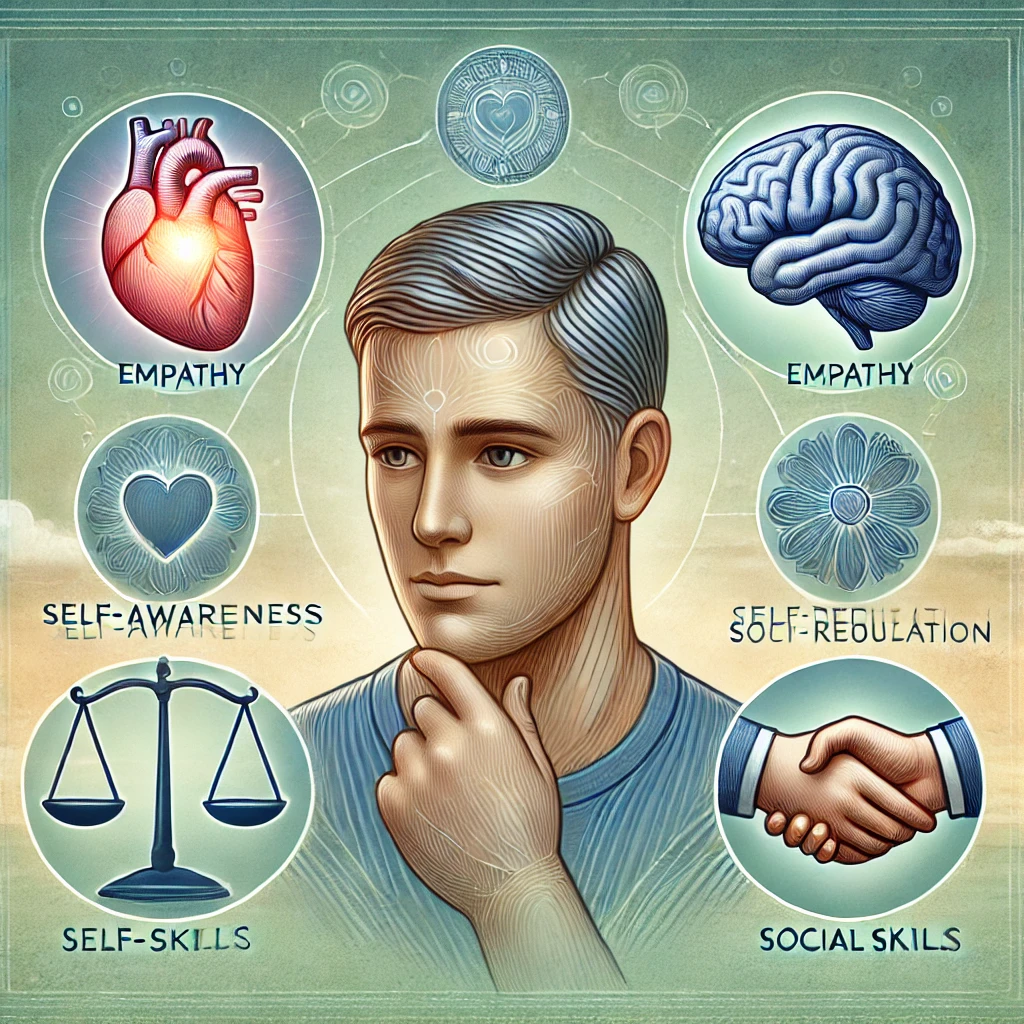Emotional Intelligence- In today’s rapidly evolving world, success is no longer defined solely by technical abilities or IQ. Instead, Emotional Intelligence (EQ) has emerged as a crucial factor that defines how effectively we handle ourselves and our relationships.
EQ is the ability to identify, understand, manage, and use emotions in positive ways. It’s what allows us to navigate complex social environments, make sound decisions, and lead with empathy.
Emotional Intelligence is the hidden force behind effective communication, conflict resolution, and leadership. Its power lies in how it strengthens connections, promotes trust, and enables us to manage stress while achieving goals.
Quotes on the Power of Emotional Intelligence
“It is very important to understand that emotional intelligence is not the opposite of intelligence, it is not the triumph of heart over head – it is the unique intersection of both.” — David Caruso
“Your emotions are the slaves to your thoughts, and you are the slave to your emotions.” — Elizabeth Gilbert
“When awareness is brought to an emotion, power is brought to your life.” — Tara Meyer Robson
Examples of Emotional Intelligence in Action

Workplace Teamwork: Sarah, a team leader, notices a member is unusually quiet during a meeting. Instead of assuming disinterest, she checks in with him after the meeting.
Her emotional intelligence helps the team member feel heard, opening up the space for support and collaboration.
Parenting with EQ: A mother notices her child is frustrated while doing homework. Instead of reprimanding the child for not completing the task, she acknowledges the frustration and helps find a calm way to work through the problem.
Power of Emotional Intelligence in the Workplace
In the workplace, EQ fosters effective communication, teamwork, and conflict resolution. A high EQ enables employees to:
Manage Stress: Being able to stay calm in high-pressure situations.
Build Relationships: Emotional intelligence allows leaders and colleagues to connect better, creating a more harmonious work environment.
Resolve Conflicts: EQ empowers people to handle disagreements constructively, by considering the feelings and perspectives of others before reacting.
Example: A manager with high EQ might notice when tensions are rising in a team meeting. Instead of ignoring it, they address the emotions of the team, guiding the conversation back to a productive and respectful tone. This not only solves the issue but strengthens the team.
Leadership: The Power of Emotional Intelligence
Leadership is not just about strategic thinking or decision-making. It’s about understanding the emotions of both yourself and your team. A leader with high emotional intelligence can inspire, motivate, and create loyalty within their team.
Leaders who demonstrate EQ can:
Motivate Teams: By recognizing and addressing team members’ emotional needs.
Foster Trust: Showing empathy and understanding builds deeper trust.
Enhance Performance: They create environments where people feel valued and, therefore, perform better.
The Four Components of Emotional Intelligence
- Self-Awareness: It is an understanding our own emotions and their impact on others.
- Self-Regulation: It is the ability to control or redirect harmful emotions.
- Social Awareness: The capacity to pick up on emotional cues and understand the needs of others.
- Relationship Management: The skill to maintain healthy relationships through communication, empathy, and conflict resolution.
The 5 Keys to Emotional Intelligence
- Empathy: Understanding and sharing the feelings of others.
- Motivation: Being driven by internal desires, not just external rewards.
- Self-Control: Regulating your emotions to maintain composure in difficult situations.
- Self-Awareness: Being mindful of your emotional states and their influence on your actions.
- Social Skills: Effectively handling relationships and building networks of trust.
Benefits of Emotional Intelligence

Improved Communication: People with high EQ can express themselves clearly and respectfully.
Better Decision-Making: EQ enables more balanced, thoughtful decision-making, especially under stress.
Stronger Relationships: Whether at work or in personal life, EQ strengthens the bonds between people, leading to more trust and understanding.
Higher Job Satisfaction: Emotional intelligence leads to a more positive workplace environment, enhancing job fulfillment.
Increased Resilience: High EQ helps people manage stress and recover from setbacks faster.
How to Boost Emotional Intelligence in Kids

Encourage Open Expression: Allow children to talk about their feelings without judgment.
Teach Empathy: Help kids understand and care about others’ feelings by asking them how they think others might feel in certain situations.
Model Healthy Emotional Responses: Show children how to handle emotions like frustration or sadness constructively.
Problem-Solving Skills: Guide them in finding solutions to emotional challenges, teaching them to process their feelings.
Positive Reinforcement: Praise emotionally intelligent behavior like sharing, kindness, or patience.
Success Rates of People with High Emotional Intelligence
Research shows that individuals with high EQ are more successful in their personal and professional lives. Studies suggest that 90% of top performers have high emotional intelligence.
These people excel in leadership, maintain better relationships, and are more likely to succeed because they can manage stress and navigate interpersonal dynamics effectively.
How to Handle Emotional Intelligence
Practice Mindfulness: Stay aware of your emotional state and how it impacts others.
Reflect Regularly: After emotionally charged situations, reflect on how you handled your emotions and what you could improve.
Seek Feedback: Ask trusted friends or colleagues how your emotional responses impact them.
Develop Empathy: Make an effort to understand the emotions and perspectives of others.
Manage Stress: Learn relaxation techniques like deep breathing or meditation to keep your emotions in check.
By understanding and harnessing the power of Emotional Intelligence, we can foster better relationships, become more effective leaders, and achieve greater success in life.
Frequently Asked Questions
1.What is Emotional Intelligence?
It is the ability to identify, understand, realize and manage our own emotions while also being sensitive to the emotions of others.
2. Why is Emotional Intelligence important?
EQ helps improve communication, deepen relationships, and manage stress, leading to greater success in both personal and professional settings.
3. Can Emotional Intelligence be learned?
Yes! It can be developed through self-awareness, mindfulness, and practice in empathy and social skills.
4. How does Emotional Intelligence affect leadership?
Leaders with high EQ build trust, foster collaboration, and effectively motivate their teams by understanding and managing emotions.
5. How do I measure my Emotional Intelligence?
EQ can be measured through self-assessments or by seeking feedback from others on how you handle emotions in various situations.




